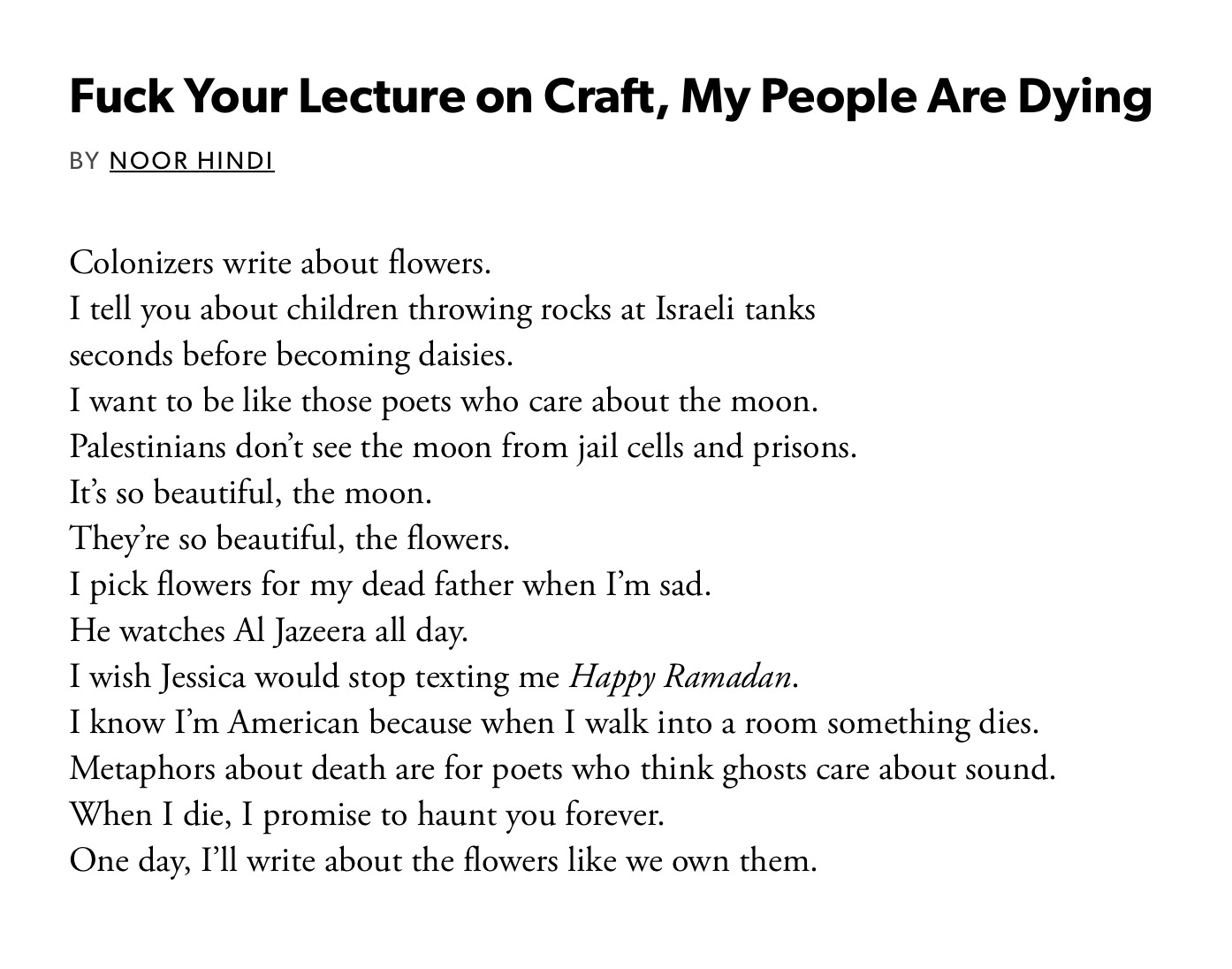If you missed it, Violets is now Left on Red. Following last week’s teaser, Left on Red will be moving to a schedule of around two posts per month for free subscribers, and extra content at about a weekly-ish interval for paid subscribers. Thank you for reading!
Today, please enjoy the Pulse, f.k.a. Expansion Pack. I love putting these lists together, and many of you like them too. It’s officially issue 4, experimenting with new categories for your reading pleasure and convenience.
The death toll in the ongoing Israel-Hamas war has now reached 21,000 people, among them beloved poets.
On December 7, beloved Palestinian poet and activist Refaat Alareer was killed in an Israeli airstrike, along with several members of his family. Prophetically, on November 1, he pinned his poem, “If I Must Die”, on Twitter/X. Since then, the poem has been translated into over 40 languages, recited by Brian Cox and gone viral, and graffitied onto subway walls. In October, Palestinian poet and novelist Hiba Abu Nada was killed in an airstrike. Her final tweet, posted on October 8 and translated from Arabic: “Gaza’s night is dark apart from the glow of rockets, quiet apart from the sound of the bombs, terrifying apart from the comfort of prayer, black apart from the light of the martyrs. Good night, Gaza.” Saleem Al-Naffar was killed by Israel’s bombing of Gaza City, where he and his family were trapped under rubble.
While trying to flee Gaza after the October 7 Hamas attack, Palestinian poet Mosab Abu Toha, author of the poem Things You May Find Hidden In My Ear, was stripped, beaten, and jailed in Gaza. His full account can be read at The New Yorker.
As the attacks continue on, poetry goes on and rings even louder and truer. There is no better time than now to understand the purpose and power of something as unproductive, with as little consensus, as poetry. See Palestinian poet Noor Hindi’s widely circulated poem:
More from The Atlantic: The Poets of Palestine.
In case you missed it: Back in November,
, the poetry editor at the New York Times, resigned. Her resignation letter is here on Substack. Related (or not?): A couple weeks later, the New York Times released its 100 Notable Books of 2023 list meant to include “notable fiction, poetry, and nonfiction”…and somehow only came up with a single poetry book (From From by Monica Youn).Poor Things is the buzzy film of the holiday season, rounding out the year of adventure films about fantastical, sheltered women learning about the real world and finding their freedom.
Described as “a story about a woman who develops by chasing her own interests and desires without having those tamped down, hampered, or abashed by society”, Poor Things basically follows the same plot line as Greta Gerwig’s Barbie—and is the only film in 2023 I can think of on par with Barbie’s spectacular production and costume design. A treat for visual and world connoisseurs.
Starring Emma Stone, Poor Things is a mix of genres—comedy, satire, fairy tale, sci-fi, fantasy, coming of age—but it might be most appropriate to call this an adventure film. Kathryn Hunter, who played a brothel madame in the film, said this: “I love that it’s a female odyssey. It has to be said that most stories are male odysseys, the journey of the male hero.” I was thinking about this, and realized that truly, every female adventure story I can think of heavily involves escaping from the gaze or entrapment, literal and figurative, of a man—or men. Exception: wicked stepmothers. Compare that to the prototypical male hero story, who gets to save others, to the woman who always has to save herself first. And then it’s less an adventure story, and more an escape, hey?
Related poems: The Applicant by Sylvia Plath and Her Tin Skin by Evie Shockley.
The game of monopolization continues. Creative tools juggernaut Adobe is no longer acquiring Figma for $20 billion and Warner Bros. and Paramount are in talks of a merger.
Adobe was set to acquire Figma, the darling of the software for designers world, for $20 billion and in a joint decision and statement, backed out of the deal. In the same week, Warner Bros. and Paramount is in discussion of a merger.
Bored of this cycle yet? I can’t help but think of The Blob, the alien creature that eats people and keeps amassing blob-ness. Mergers and acquisitions, growth and more growth, until like history is set to keep proving again and again, everything goes out in a bang and brings thousands of jobs with it, not before burning every employee to the edges of productivity to grow, grow, grow lest we get eaten.
One of the interesting things about poetry is that it has always existed, and yet, it’s somehow escaped the tyranny of monopolies. The pessimist could say that’s because there’s so little money in it no one has any desire to monopolize something that’s so obviously a terrible business decision. Who would dare, indeed.
MORE POETRY NEWS + LINKS + READS
*= paywalled
Poetry may not be a luxury*, but it sure is in this case: DesignLab, a creative studio based in Dubai, created Memoir, an immersive wedding experience based on a love poem written by the bride’s grandfather, Sheikh Zayed bin Sultan Al Nahyan, founder of the United Arab Emirates. (*Credit to Audre Lorde.)
Poetry in law enforcement: The Surrey RCMP (that’s them Mounties) recently shared news of a break-in, in the form of a poem. Why? Well even the police have Christmas spirit. The full story and poem here.
Thirteen days until Christmas, when an alarm started to beep,
in the 13600-block of 102 Avenue, while the city was asleep.At approximately 2:15 a.m., the call came in,
frontline officers showed up to see if anyone was trying to break in.
Megan Fox came out with a poetry book: Pretty Boys Are Poisonous.
I had wanted to mention this during October when the show first came out, but if you haven’t watched The Fall of the House of Usher on Netflix, it’s American Horror Story meets Succession set against the background of Edgar Allan Poe lore, featuring a protaganist who goes from poet to pharmaceutical juggernaut—and faces the horrifying consequences.
Julia Stiles gets emotional as she recites the poem from her iconic 10 Things I Hate About You scene.
In security, tech, and AI news: researchers asked ChatGPT to repeat the word “poem” forever, and it spit out random strings of text including people’s sensitive private information used apparently as training text.
The Invisible Forces Behind What We Read over on The Atlantic. (*)
Elsewhere in the literary world, drama unfolded over the last month when Cait Corrain, a soon-to-debut author, review-bombed their fellow debut authors (the majority of whom were people of colour). When they were found out via a 31-page google doc full of evidence, they faked a conversation with a friend. There’s been an apology and Cait’s publisher has dropped them. The whole debacle is a lesson in what not to do when you’ve gotten the book deal most writers can only dream of. Here’s the whole thing explained.
Travel advisor Deborah Calmeyer partnered with poet
to design a Kenyan safari inspired by poetry. Next June.Joshua Woods captured LaKeith Stanfield in this video (slide 5), with Emily Dickinson’s I felt a funeral, in my brain for AnOther Magazine’s Fall/Winter 2023 issue.
Pop quiz. What’s the bestselling single of all-time? It’s White Christmas by Bing Crosby. From
, I enjoyed this deep dive into the life and impact of the ultimate cool guy, and…tech innovator?
Under slightly different circumstances, he could have established the venture capital model that now pays most of the bills in his old Hillsborough neighborhood. Bing had the vision—he had proven on two momentous occasions that he understood how tech could change the world. He also had cash to invest, and was now on the scene in Silicon Valley to put it to work.
Why didn’t he do so?
My hunch is that he was just too cool. You need to be more intense to end up like Steve Jobs or Mark Zuckerberg or Bill Gates. But Crosby was out playing golf and joking with his friends, when he wasn’t flying down to Hollywood to make a movie or TV appearance.
Truth to tell, Bing Crosby didn’t need more money or a tech empire. But we might all be better off, if people with his cool cultural acumen had made the key decisions on tech platforms. He made singing more nuanced and aligned with people’s feelings. Wouldn’t it be great if he had done the same thing with Silicon Valley?
EVENTS
Taipei, Taiwan: “Arabic -- the Language of Poetry and Arts”, at Taiwan's National Central Library from December 18-31
FAVOURITES TO LEAVE YOU WITH
Book read: Monsters by Claire Dederer
Internet read: The Sphere by
(via Paris Review)This was the place that I feel to be the center of the Sphere—where what was imagined, directed, and awesome met the stuff of our world, concrete and plastic and trudging through time.
Poem read: After Reading “Mock Orange” by
(From You Could Make This Place Beautiful)Thing read:
“Did you know the word lesbian was not added to the Oxford English Dictionary until 1976? Incredibly, when it finally did get an entry, the following treasure from writer Cecil Day-Lewis was included as the example sentence: ‘I shall never write real poetry. Women never do, unless they’re invalids, or Lesbians, or something.’”
—From Wordslut by







